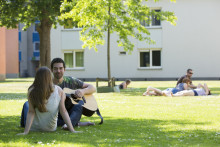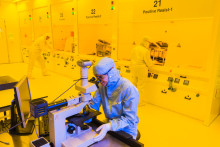Even an amateur can perform an attack. This is what UT-professor safety studies Kees van der Vijver says. He also says: this time it was a plane on a sky scraper - next time it will be something else. Sombre notes from an expert.
Kees van der Vijver is not exactly standing next to the United States, as prime minister Kok would prefer to see it. The safety professor expresses cynical comments on the 'effective' war against terrorism, as announced by president Bush. 'It would be the first effective war in history. At the same time they promised that it would take a long time. That is new: promising a lingering conflict.'
Which repercussions will this 'new war' have on the safety of Dutch society? Van der Vijver was head of criminal investigation at the police department in IJmuiden; he did research for ten years at the Ministry for the Interior, department police; he was Chief of Police in Amsterdam for eight years and director of the Foundation for Safety and Police for seven. Maybe he knows.
Former Secretary for the Interior Bram Peper advocates a Safety Secretary. Good idea?
'No, I do not think so. The other Secretaries will in this way be relieved of their responsibility for safety. That is a recipe for trouble. I do think that it is desirable to have a co-ordinating secretary. For example the one for the Interior. Someone to make sure that all information comes together.'
Identity cards. Screening Arabs. Snitch lines! Good idea?
'The urge to control belongs to the aftermath of the attacks. At this moment many people feel that the effect is more important than a civil liberty like privacy. But that will diminish. Take the case of the IRT. The IRT, interregional investigation team, was set up to catch large crooks. To be more effective the team on occasion steered clear of the law, even ignored it. The committee-Van Traa again put civil liberties first. The problem is that with Van Traa's norms you cannot combat terrorism.'
So we do need a society of snitches?
'That is what we have to guard against. Society is growing to a different kind of social control than before. On the one hand is neighbourhood prevention increasing because of rising feelings of insecurity among civilians. People again pay attention to their neighbours. At the same time neighbours are more and more unfamiliar: large flows of migration across the world bring about that nobodyknows exactly who has moved in next door. You see that in the case of Mohamed Atta, one of the hijackers. He led a nondescript life in Hamburg for years.'
'You see, an open society like ours is based on consensus and trust. I assume that you will not put strange words into my mouth in your piece. Let alone that I am afraid that you plan to do something with a box cutter. Yet, it could happen. That is how the western world functions. The attacks in America have temporarily broken that trust and consensus.'
How do you restore that trust? By armouring cockpit doors?
'The El-Al has been doing that for years, locking cockpits. The problem with those kinds of measures is that if nothing happens for a time, attention slips. Also, terrorism can take a number of shapes. Terrorists will certainly not strike again in the same way.'
The government should direct its attention to other possible weak spots?
'Yes. Although that does not guarantee success. Look at the intelligence services. A disaster scenario in which a hijacked plane landed on the Pentagon did exist.'
Did the domestic intelligence services fail?
'I do not think you can say that. You never hear about what is foiled by the intelligence services. To protect sources. Only if something goes wrong, the whole world knows.'
'Terrorism will continue to be extremely difficult to fight. Even an amateur can go a long way. The trouble with terrorists is that they need not come out. Organised criminals have to surface at one time or another. To sell their wares, to launder money. You never see a terrorist again.'







